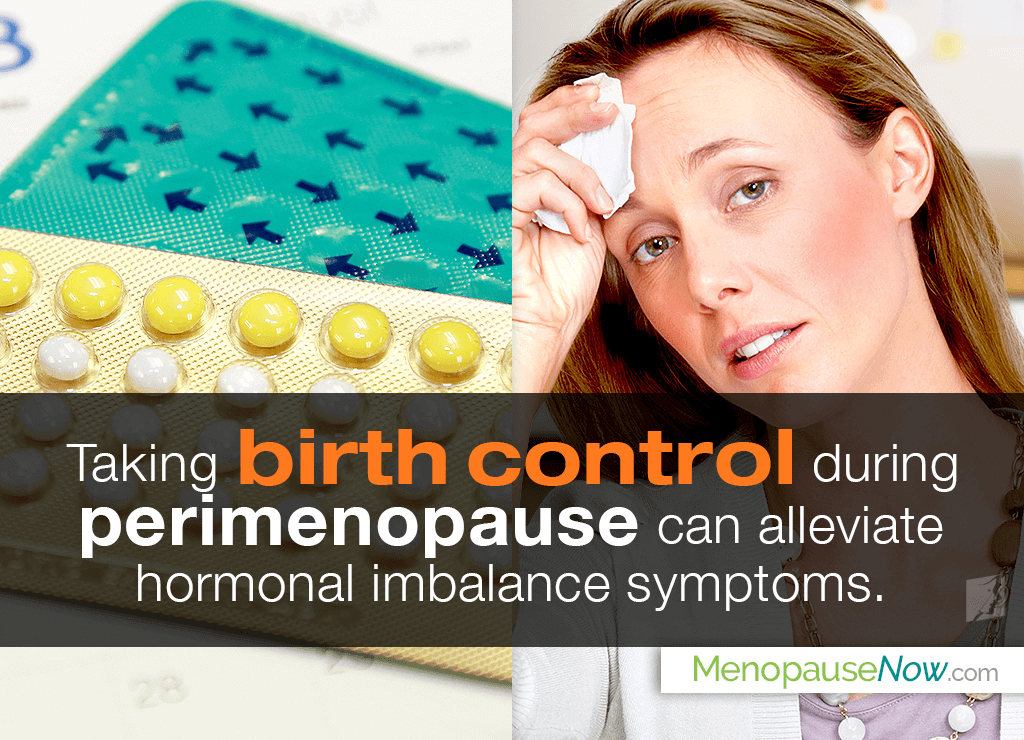There is much confusion surrounding the use of contraception - colloquially known as birth control - in women who are entering the menopausal transition. In order to make the most informed decisions regarding one's hormonal health, it is essential to clear up any ambiguities.
Continue reading to learn all about birth control for perimenopause, including the purpose of taking it, benefits, risks, and much more.
About
Birth control during perimenopause can serve two purposes: as contraception for those women who still haven't been diagnosed with menopause and don't want to get pregnant as well as for symptom relief for those not wanting to take hormone replacement therapy (HRT).
Birth control for perimenopausal women comes in various types, such as:
- Pills
- Patches
- Vaginal rings
- Implants
- Intrauterine devices (IUDs)
They can contain a combination of estrogen and progestin (synthetic progesterone) or be progestin-only.
Which birth control is right for you will depend on various factors. It is recommended to explore options with low doses of hormones, especially for women who have an increased risk factor for hormone-driven health conditions.
For example, data suggesting older women using the pill may have an increased risk of breast cancer can encourage these women to consider using a different birth control type.1
As such, it is crucial to speak with your doctor about any potential health risks associated with each type in order to avoid any unexpected complications later on in life.
Benefits
As aforementioned, birth control is not only effective to prevent pregnancies, but also to help women regulate their menstrual cycles, especially those suffering from irregular periods, including amenorrhea, or endometriosis.
Moreover, taking low-dose birth control pills during perimenopause can alleviate hormonal imbalance symptoms, such as symptoms of menopause. These include, but are not limited to:
Taking birth control during menopause can also decrease the decline in bone mineral density (BMD), allaying the onset of osteoporosis later on in life.
Furthermore, birth control can lower the risk of certain cancers, such as ovarian and uterine cancer. As a matter of fact, it is acclaimed that they can reduce the risk of ovarian cancer by up to 50 percent.1
Risks
While low-dose birth control generally does not provoke side effects, the following can occur:
- Headaches
- Nausea
- Mood swings
- Bloating
- Breast tenderness
- Breakthrough bleeding
- Cramping
- Increased blood pressure
- Low blood sugar
It is important to discuss any adverse reactions with a healthcare provider. Birth control may be switched for another type depending on personal preference and current health status.
Also, one's health risks will depend upon the type used and the hormones it contains, as combination birth control presents different risks than progestin-only.
In all cases, birth control during menopause is not recommended for those who have a history of breast cancer, heart disease, or deep blood clots. Estrogen-containing birth control methods are specifically contraindicated for those with hypertension, diabetes, or migraines; who are obese; or who smoke.
When to Stop
A logical question to ask when taking birth control for perimenopause is when to cease use.
Whether used for contraceptive purposes, symptom relief, or both, some medical professionals recommend to continue use until age 55, when the likelihood of having reached menopause is high, which means the odds of getting pregnant are low or nil.
At this age, if women are looking for symptom management, they may consider transitioning to HRT or find natural alternatives to exogenous hormone use.
Alternatives for Symptom Relief
Because of the high risk of taking exogenous hormones like birth control or HRT during perimenopause, many women are turning to less risky alternatives to alleviate symptoms.
These menopause symptoms treatments work principally with lifestyle changes alongside the use of alternative medicine to promote optimal endocrine health and hormonal balance.
Key Takeaways
While there is much confusion surrounding the use of birth control for perimenopause, the reasons for doing so are quite simple: to prevent pregnancies, alleviate symptoms, or both. Birth control during menopause comes in a variety of types, with pills being the most common, allowing women to choose the type that best fits their preferences and hormonal needs, keeping in mind that the use of exogenous hormones does pose risks, such as bloating, nausea, and cramping, among others. As such, alternative treatments are gaining ground in helping women find the hormonal stability they need for an improved quality of life.
Sources
- Center for Young Women's Health. (2018). Medical Uses of the Birth Control Pill. Retrieved October 22, 2019, from https://youngwomenshealth.org/2011/10/18/medical-uses-of-the-birth-control-pill/
- Cho, M.K. (2018). Use of Combined Oral Contraceptives in Perimenopausal Women. Chonnam Medical Journal, 54(3), 153-158. doi: 10.4068/cmj.2018.54.3.153
- Harvard Health Publishing. (2018). Perimenopause: Rocky road to menopause. Retrieved October 22, 2019, from https://www.health.harvard.edu/womens-health/perimenopause-rocky-road-to-menopause
- Healthy Women. (2019). Progesterone. Retrieved October 22, 2019, form https://www.healthywomen.org/condition/progesterone
- Hormone Health Network. (2019). Progesterone and Progestins. Retrieved October 22, 2019, from https://www.hormone.org/your-health-and-hormones/glands-and-hormones-a-to-z/hormones/progesterone
- NHS. (2017). How do I know I've reached menopause if I'm on the pill? Retrieved October 24, 2019, from https://www.nhs.uk/conditions/contraception/menopause-contraceptive-pill/
- The North American Menopause Society. (2016). Contraception for Perimenopausal Women. Retrieved October 22, 2019, from https://www.menopause.org/for-women/menopause-take-time-to-think-about-it/consumers/2016/12/05/contraception-for-perimenopausal-women
Footnotes:
- Memorial Sloan Kettering Cancer Center. (2018). Birth Control and Cancer Risk: 6 Things You Should Know. Retrieved October 22, 2019, from https://www.mskcc.org/blog/birth-control-and-cancer-risk




